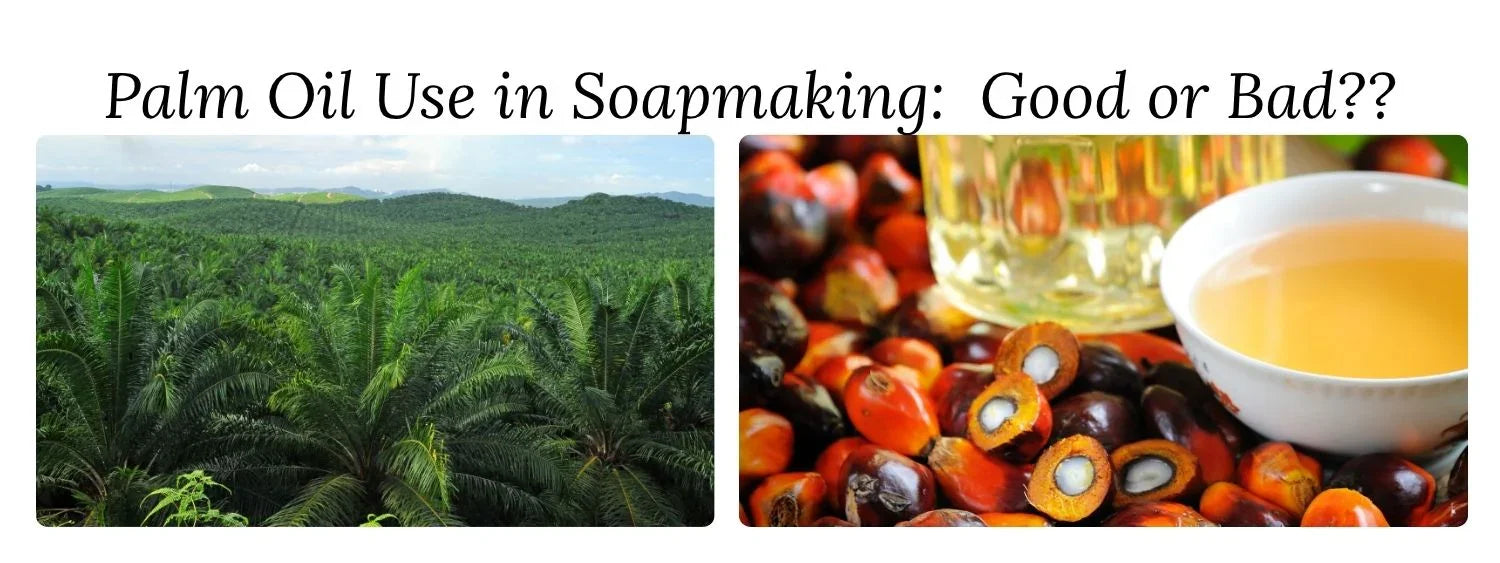
Using Palm Oil In Soapmaking: Sustainability vs Soap Attributes
Palm Oil in Soapmaking: What You Need to Know About Sustainability and Skin Benefits
If you’ve ever browsed the ingredients list on handmade soap, chances are you’ve come across palm oil. It’s a common ingredient in both commercial and artisan soaps—and for good reason. But in recent years, the use of palm oil has raised environmental and ethical concerns. So how do soapmakers reconcile the benefits of palm oil with the need for sustainability?
Let’s explore why palm oil is used in soapmaking, what “certified sustainable palm oil” means, and how to make informed choices as a consumer.
Why Is Palm Oil Used in Soapmaking?
Palm oil plays a valuable role in cold process soap for several reasons:
- Hardness: Palm oil contributes to a firm, long-lasting bar of soap that won’t melt away too quickly in the shower. Who doesn't want a long lasting bar?
- Lather: It helps create a creamy, stable lather when used in combination with other oils.
- Mildness: Soaps made with palm oil tend to be gentle and non-irritating, making them a great option for people with sensitive skin.
- Stability: Palm oil has a long shelf life, which helps prevent soap from going rancid over time.
It’s also a very efficient crop—producing more oil per acre than any other vegetable oil—which keeps costs lower and helps small soapmakers maintain affordable pricing.
The Controversy Around Palm Oil
Unfortunately, the high demand for palm oil has led to deforestation, habitat destruction (especially in Southeast Asia), and negative impacts on indigenous communities. That’s why many consumers and makers have grown wary of its use.
But not all palm oil is created equal.
What Does “Certified Sustainable” Palm Oil Mean?
Certified Sustainable Palm Oil (CSPO) refers to palm oil that has been grown and harvested according to strict environmental and social standards set by organizations like the Roundtable on Sustainable Palm Oil (RSPO). When a soapmaker uses CSPO, they are:
- Avoiding deforestation: Certified plantations must not contribute to the destruction of primary forests or habitats of endangered species like orangutans and tigers.
- Protecting workers' rights: CSPO standards promote fair wages, safe working conditions, and respect for local communities.
- Promoting transparency: Sustainable palm oil supply chains are traceable and regularly audited.
In short, choosing CSPO helps support ethical farming practices while still benefiting from the unique properties that palm oil brings to soap.
Dr Soaper's Commitment to Sustainability
At Simply Soap by Dr. Soaper, we use only certified sustainable palm oil whenever palm oil is used. This allows us to offer a nourishing, long-lasting bar of soap without compromising our values—or yours. For customers who prefer palm-free options, we do offer these as well.
Final Thoughts
Palm oil is not inherently harmful—its misuse is. By supporting small makers who prioritize certified sustainable sources, you can enjoy the benefits of this versatile oil while contributing to a more ethical and eco-conscious industry. Also keep in mind that although studies have shown that cooking with palm oil can raise cholesterol levels and negatively impact heart health, no such risks are associated with using palm oil externally as a soap ingredient.
So next time you pick up a handmade soap, don’t just read the ingredient list—ask about where those ingredients come from. A little knowledge goes a long way toward making cleaner choices for your skin and the planet. Get started by buying one of the numerous handmade soaps at Simply Soap.
0 comments